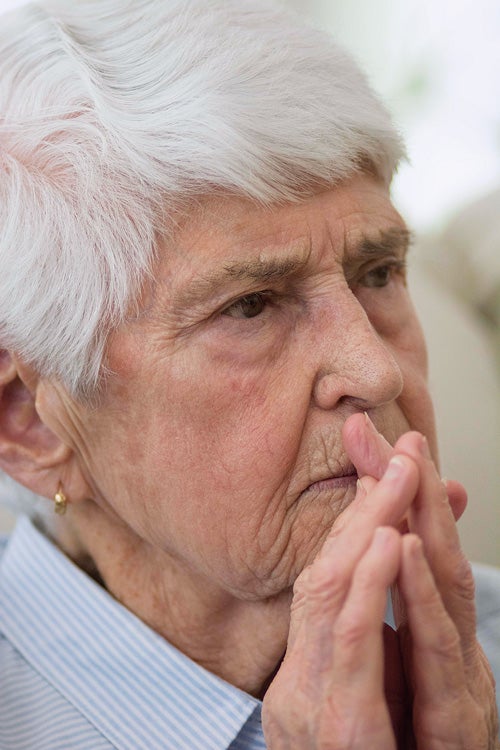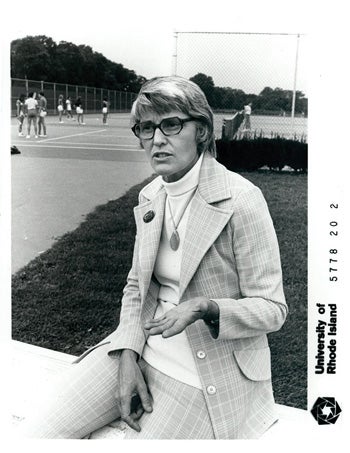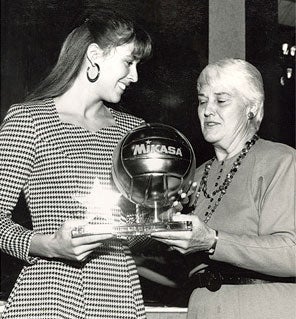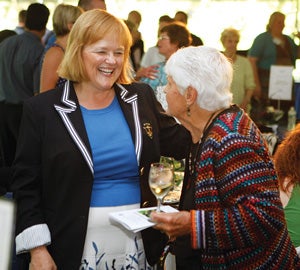The Grueling Politics of Women and Sports


By Pippa Jack
It’s hard now to convey just how radically different the landscape was for female athletes when Eleanor “Ellie” Lemaire was growing up.
Consider this: As a student at Boston University’s Sargent College in the late 1940s, the carpenter’s daughter and her classmates got wind of a local women’s sports league. “We’d pile six people in a friend’s convertible and go play,” Lemaire recounts. “We won every damn game.”
They knew they might get in trouble. “We were playing full-court basketball, men’s rules, and women were supposed to play half-court,” says Lemaire. “We all used false names.”
Sure enough, during the final round, disaster struck: “I remember going up for a shot and seeing four professors from Sargent.”
The classmates were studying to be physical education teachers. But incredibly enough, actual competition was considered “unhealthy, unwise, and bad for our menstrual cycles,” Lemaire says. “We were all suspended.”
Title IX: No person in the United States shall, on the basis of sex, be excluded from participation in, be denied the benefits of, or be subjected to discrimination under any education program or activity receiving federal financial assistance.
The law has implications for areas from math and science education to sexual harassment on campus and the rights of transgender students, but its biggest impact has been on collegiate athletics.
Lemaire’s roommate also ran up against the school’s restrictive philosophy. Janet Moreau Stone qualified for the 1951 Pan American games in Buenos Aires (she would go on to win gold at the ’52 Olympics in Helsinki for the 4×100 relay). But when she approached the dean to ask for the time off, he didn’t approve. “He told me, ‘I can’t guarantee you will graduate,’” Stone recalls. “My poor dad, who had saved so much and worked three jobs for me to go to college, told me I was going. I could worry about college afterward.”
Both women came from working class French families in Rhode Island, Lemaire from Bristol, Stone from Pawtucket. They worked as live-in nannies together their first year at Sargent to save on dorm costs. “She and I had a lot in common,” says Stone, still fit and vibrant at 88 years old, “except that she was brighter than me.”
They would both go on to work for the Barrington, R.I., school system. Stone worked at the middle school, while Lemaire took charge at the high school, where she established the first girls varsity sports program at any public school in the state. Lemaire bootstrapped it, doing things like persuading parents to let the girls use home tennis courts in return for yard work. She created possibilities out of sheer charm and force of will—the defining theme of her remarkable career. Another example: After she landed at the University of Bridgeport’s Arnold College in 1963, she conjured a sailing program out of the wind by convincing a local sailboat manufacturer to donate boats in return for using the coeds in their ads.
Those memories are still vivid for Lemaire, who at 87 years old is frank about her early-stage Alzheimer’s but remains a sparkling, warm and whip-smart conversationalist. She was a tenured professor and had climbed to director of women’s sports at Bridgeport when the nation first realized what a game-changer Title IX would be; in addition to her paid work, she helped lead organizations that lobbied for change. “She helped shape and educate others about the government regulations, devoting significant time to speaking at Title IX conferences and workshops,” says Donna Lopiano, a national sports consultant and former CEO of the Women’s Sports Foundation who describes Lemaire as “a foremother and mentor.”
Signed into law by President Nixon, Title IX’s language had originally been part of the Equal Rights Amendment, but was added to the Education Amendments of 1972 when it became clear the ERA wasn’t attracting support. Its original language made no mention of women’s athletics, a phrase in any case rarely used then—collegiate sports programs for women were mostly nested inside physical education departments and served the goal, along with home ec class, of fashioning well-rounded women and future wives.
Before Title IX, Lemaire and her peers “coached and officiated women’s athletic competition, frequently for no pay, and often funded women’s teams out of their back pockets,” Lopiano says.
That changed as athletic directors grudgingly accepted Title IX’s ramifications. At the University of Rhode Island, the colorful and politically savvy Maurice “Mo” Zarchen ’49 was ahead of the curve. He invited a champion women’s golfer to join the men’s varsity team in 1972, even as other schools were still protesting the new law. By 1976, the year Title IX actually went into effect, it had become clear that allowing women simply to play on men’s teams was not going to cut it. Zarchen advertised for a director of women’s athletics, and hired Lemaire, then 47.
At the time, she told The Scribe, the University of Bridgeport student newspaper, that she had applied “halfheartedly,” but was glad to be going to a place “not limited by inadequate facilities, where the possibility for growth is a reality.”
Grow the program she did, establishing ten intercollegiate women’s sports teams within just three years, her long days and working weekends legendary. She found in Zarchen, who died in 2010, a worthy opponent in the endless battle for funds, and reminded him often that he had two daughters—“unfortunately neither were very keen on sports,” she laughs. She outlasted him, serving under two more directors during her 16-year tenure at the University.

Lemaire never married—from the day she graduated Colt High School, she says, “I was a career person, and every bit of it was a joy.” She formed many firm friendships with men, but her life was defined by her relationships with women. They were her mentors, mentees, friends, housemates, they were the thousands of students whose lives she changed. From the Bristol Girl Scout leader who taught her a love of sailing to Madge Phillips, the close friend whose research helped shape Title IX, it was other women who gave her the steel to spend so many years fighting, while their successes served as her reward.
At URI, she spent her daytime hours with the women’s coaches, who often had to coach two sports, and participating in every board and committee she could, at the University and outside it. (“I had to,” she says. “The groups had the power to get things done.”) She got her administrative work done later, toiling into the wee hours so routinely that she had an arrangement with a Chinese restaurant near her home in North Kingstown: “I’d call and they would leave a container of noodles on their front steps,” she says.
She fought to use the fields, to use the gym, to build locker rooms, to buy uniforms and shoes with cleats, to hire coaches, to pay them anything like what the men’s coaches were earning. To afford transportation, “We’d have bake sales,” she says, “or parents would drive the students out of state.”
She initially resisted scholarships for female athletes, believing they would tarnish women’s sports with the commercialism that ruled men’s sports, muddying decisions that students should make based on academics alone.
But once it became clear the program would be left behind without scholarships, “she got on board, and knew how to use them,” says Bob Schneck, the enormously successful women’s volleyball coach Lemaire brought on in 1981. “I was hired right out of being a high school coach, which would never happen today,” he says. “I often think that if it wasn’t for Ellie, my whole life would have been different.”
Schneck, like the other women’s coaches, would do things like drive his team to West Virginia for a match, then turn around and drive them home, not sleeping for two days. “Now we have a bus and a driver,” he says. “But that’s only in recent history.” He says Lemaire expected a lot of her coaches: “She was hard-nosed, and she’d let you have it, but we all respected her. She really was a warrior for women’s athletics. We’re a small school, but we were recognized nationally, and it was because of her.”


When Lemaire retired in 1992, the long days had taken their toll; she wanted to sail, golf, “put my own house in order,” she told the Providence Journal. The lonely struggle of those decades, for women administrators across the country, is perhaps best encapsulated in an observation she gave the Narragansett Times about Title IX: “The problem is, people have always looked for ways around it.”
In both retirement articles, she noted a 1991 Supreme Court ruling that made it possible for women to sue institutions for noncompliance. “Now, everybody wants to be a hero,” Lemaire observed mischievously to the Times. She believed that things were changing.
Lauren Anderson, whom Lemaire had hired in ’77 as track coach, became the University’s next SWA (the term now used to denote the senior woman administrator in athletics). Like Lemaire, she tried to hire female coaches for women’s sports, although “as soon as women’s coaching was paid, men wanted the jobs,” she observes. “And of course they had more qualifications.”
The pie that men’s and women’s athletics had to split was never big enough, and women’s sports never commanded the crowds and newspaper headlines that men’s did. In 2007, the year before she would retire, Anderson told a student audience at Keaney Gym: “College athletics should not be all about money, but if money were limitless, Title IX would not be controversial.”
That remains as true today as it was then. “Things are much better, and now it’s not just the women administrators who are fighting,” says Gina Sperry, the University’s current SWA. “The struggle for equity is a shared role. But there will always be a need to monitor.”
It’s a national need. In the 34 years since Title IX became law, the number of women playing at the college level has grown a staggering 600 percent—a success by any measure. But across the country, the percentage of female coaches is dropping, while minority women have not shared the same gains as white women, according to the Women’s Sports Foundation. And the annual reports every school must file under the Equity in Athletics Disclosure Act show that most schools miss the mark in indices such as recruitment, coaching salaries and game-day expenses, where numbers are skewed by revenue-generating but expensive programs like men’s basketball and football.
It’s a syndrome with which Lynn Baker-Dooley is all too familiar. “I was of the generation that didn’t have Title IX,” says Baker-Dooley, the wife of University President David M. Dooley and, as a Baptist minister, someone intimately familiar with the challenges of working in a male-dominated field. In her college days, “Friday and Saturday nights, it was basketball all over the Midwest. I remember my dad being appalled that my teammates and I had to drive my car while the boys had a bus with plenty of room. We would follow them to the restaurant, where their steak was provided, while we’d pool our money for fries.”
Baker-Dooley’s work-study job: washing the men’s uniforms.
The Dooleys came to Rhode Island in 2009; as her husband took the University’s reins, Baker-Dooley got to work establishing a fundraiser for women’s athletics. Now in its seventh year, An Evening of Grapes and Grain has been raising $60,000 or more a year for everything from an outdoor batting cage to moving urinals out of converted women’s locker rooms.
The Dooleys carry the torch for Lemaire’s educational philosophy. Female Rams come here to study the major of their choice, not always the case in Division 1: “At many schools, your major is dictated. We let our female athletes study whatever they want,” Baker-Dooley says. “That includes subjects like nursing, with labs that coaches have to schedule around.”
The couple has no plans to leave the University soon, but Baker-Dooley is looking ahead. “What happens when this stops?” she asks. “Realistically, it’s not likely the next president will fundraise for women’s athletics.”
She envisions an endowment that can fill the gap, an enduring legacy in support of women’s athletics. “And when you think legacy,” she says, “you think Ellie Lemaire.”
So Lemaire will serve as honorary chair of Grapes and Grain this June 11, which will raise money for the Ellie Lemaire Award fund. “It feels like a tribute to my life’s work,” Lemaire says.
And as attendees enjoy the festivities on the lawn of the President’s House, Baker-Dooley will reflect: “How much we slip back,” she says, “if we don’t stay vigilant.” •
〉〉 For more information, visit uri.edu/grapesgrain

 Home
Home Browse
Browse Close
Close Events
Events Maps
Maps Email
Email Brightspace
Brightspace eCampus
eCampus


